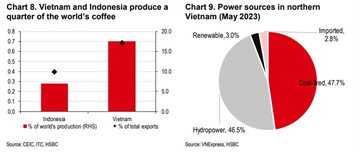- © Copyright of Vietnamnet Global.
- Tel: 024 3772 7988 Fax: (024) 37722734
- Email: [email protected]
vietnam's agricultural exports
Update news vietnam's agricultural exports
‘Carbon footprint’ tracking for Vietnamese dragon fruits applied for first time
For the first time in Vietnam, a system to track ‘carbon footprint’ for dragon fruits has been applied in Binh Thuan Province, the largest dragon fruit growing area in the country.
Enterprises urged to pay attention to pesticide residues when exporting to RoK
The VN Trade Office in the Republic of Korea has urged enterprises to strictly comply with regulations on pesticide residue levels when exporting farm produce to this market.
Farm exports expect breakthrough
Vietnam's export of agricultural products recorded impressive growth in the first month of 2024 and is expected to see a breakthrough in the whole year.
Vietnam’s agricultural exports to China expected to rise
Vietnam expects to increase its agricultural exports to China as the neighbouring country agreed earlier this year to review regulations permitting the official export of Vietnamese poultry meat.
Agro-forestry-aquatic exports up 79% in January
Vietnam earned 5.14 billion USD from agro-forestry-aquatic exports in January, a year-on-year surge of 79.2%, the Ministry of Agriculture and Rural Development reported.
More of Vietnam’s farm produce can officially enter China
Deputy Minister of Agriculture and Rural Development Tran Thanh Nam had good news for millions of avocado and passion fruit growers and animal breeders after returning from a business trip to China.
With a bountiful crop in 2023, farmers pocket big money
The prices of farm produce climbed to new high in 2023. Tens of thousands of durian farmers have become dong billionaires, while the incomes of rice and coffee farmers increased by twofold.
Nearly 3,000 firms receive codes to export agricultural products to China
Nearly 3,000 Vietnamese firms have received codes granted by China, enabling them to export farm produce and food products to the Chinese market.
Five farm export items favored by Chinese bring billions of dollars
China is a loyal export market for Vietnam’s farm produce. Five Vietnamese products exported to the market have brought turnover of $1 billion or higher.
Farm produce export hoped to soar in year-end
Agricultural product export is expected to continue to be a bright spot in Vietnam's economic picture in 2023 thanks to domestic firms’ efforts to exploit international markets.
Farm produce prices reach record high, farmers bag high profits
Durian, rice and other farm produce such as sugarcane, coffee and sweet potatoes have seen prices rise to record highs.
New records set in agricultural product export revenue
Many agricultural products such as rice, coffee, cashew and durian have set their own records in export revenue, contributing to brightening the picture of Vietnam’s exports for this year.
Vietnamese natural fresh dehusked coconuts get green light to enter US market
Natural fresh dehusked coconuts from Vietnam have officially been licensed to enter the US market, with the fruit product expected to bring in US$1 billion in the near future, according to the US Department of Agriculture.
China becomes largest export market of Vietnamese agricultural products
The Ministry of Agriculture and Rural Development yesterday announced that China is becoming the largest consumer of Vietnamese agricultural products.
China, US, Japan become key importers of VN agro- forestry-fishery products
China, the US, and Japan continued to make up the three largest export markets for Vietnamese agricultural, forestry ,and fishery products in the opening seven months of the year, according to the Ministry of Agriculture and Rural Development.
Vietnam’s exports of agriculture, forestry and fishery have low value
According to economists, Vietnam’s exports of agriculture, forestry and fishery have low value because the country has sold raw materials.
VN's rice and coffee acutely vulnerable from El Nino: HSBC economists
Vietnam's farm produce such as rice and coffee is acutely vulnerable to El Nino.
China drives Vietnam's agricultural export boom
Vietnam's agricultural exports to China have surged, solidifying its position as the top trading partner for Vietnam and propelling export growth.
China praises Vietnam’s farm produce, but makes modest purchases
Chinese importers highly appreciate the quality of Vietnam’s farm produce, saying they want to buy in large quantities. But, in fact, the two sides continue to make modest transactions and there is no sustainable supply value chain.
Vietnamese agricultural exports rebound
With the export of several agricultural products such as rubber, coffee, and pepper gradually recovering, there remains a positive outlook ahead for export growth to major markets in the second quarter of the year.



















